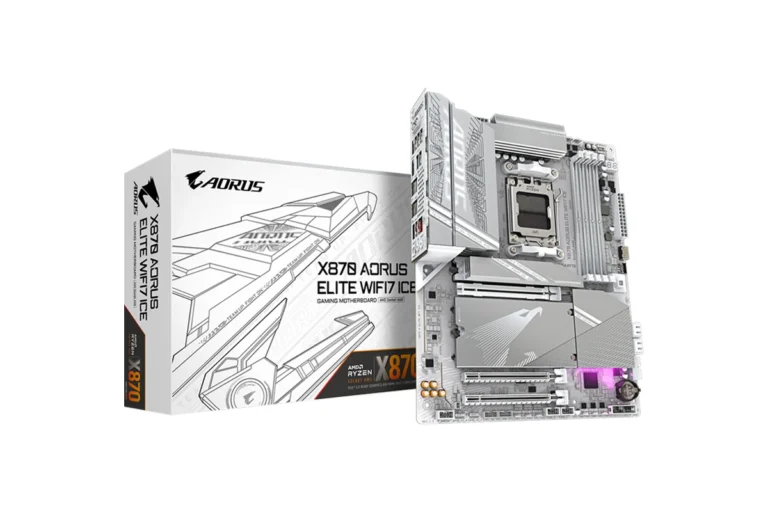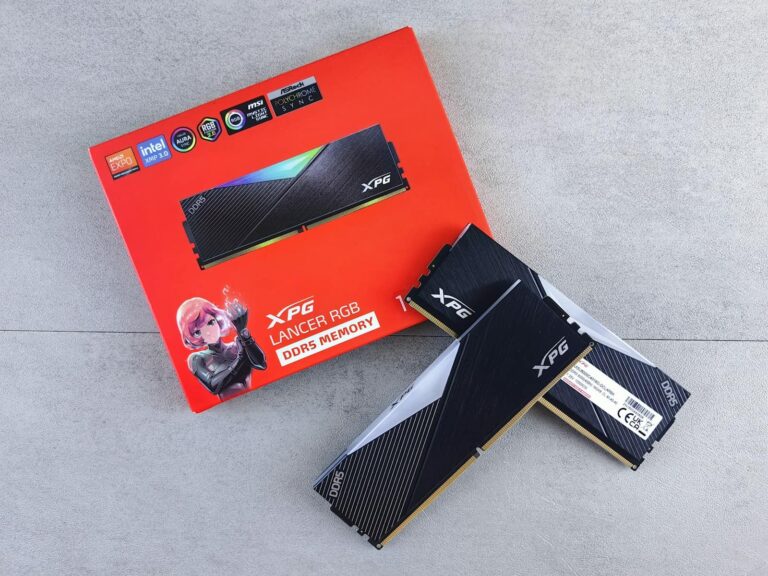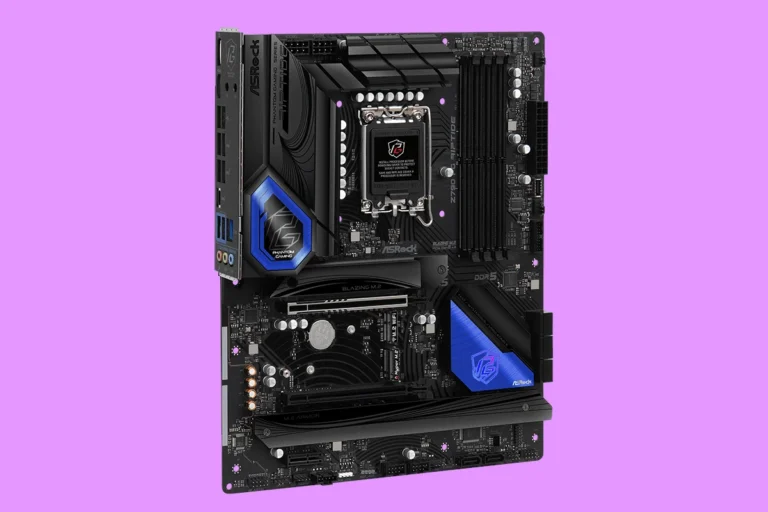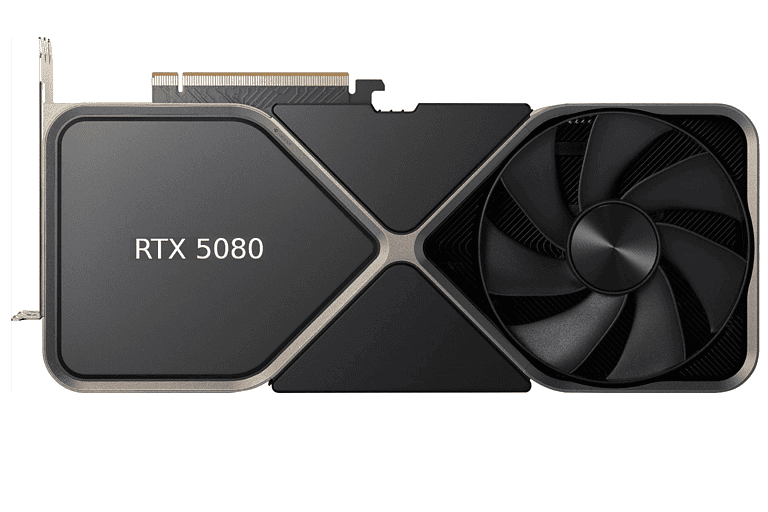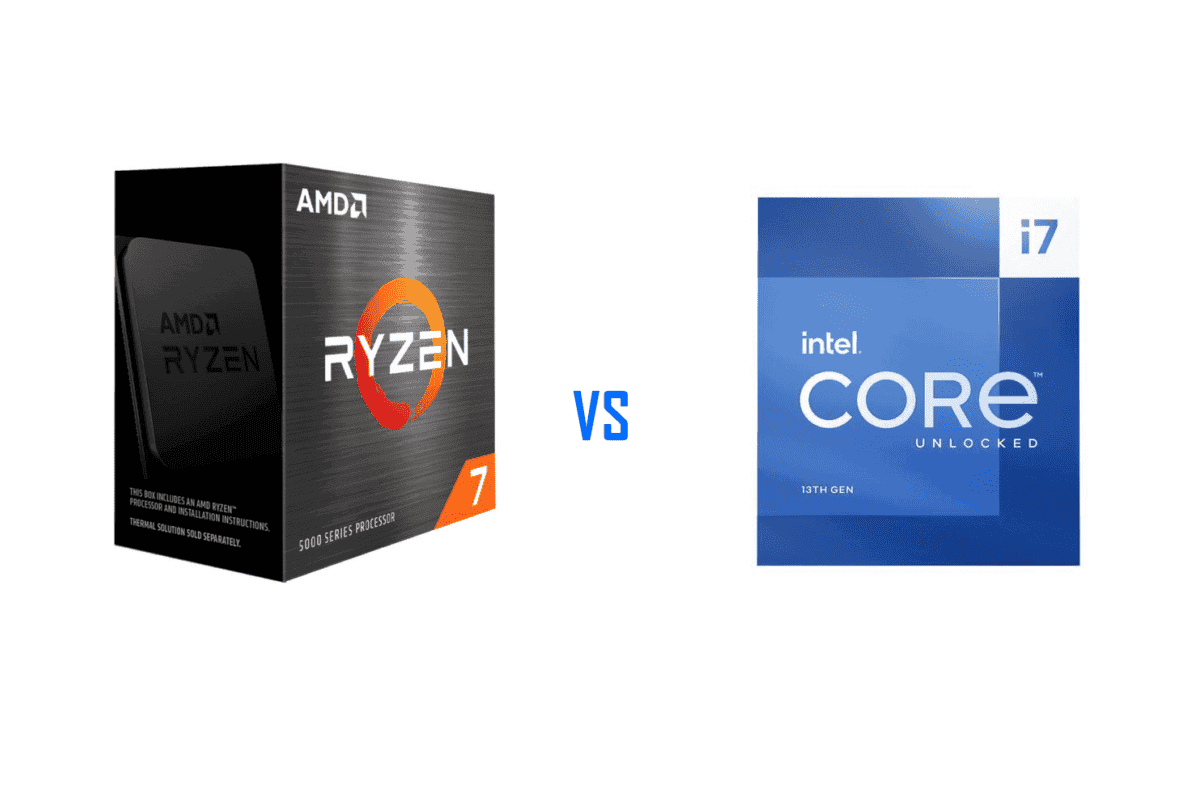
When considering the CPU market, two prominent names stand out: AMD and Intel. Their fierce competition is epitomized by their leading mainstream processors, the AMD Ryzen 7 and Intel Core i7. Here are some tables comparing AMD Ryzen 7 and Intel Core i7 processors and showing you which are equivalents.
Intel Equivalents to AMD Ryzen 7

| AMD Ryzen 7 Series | Intel Core Series Equivalent | Notes |
|---|---|---|
| Ryzen 7 9700X | Core i7-14700K or Core i9-13900K | The 9700X delivers impressive performance, often rivaling Intel’s top-tier i9 processors in multi-threaded tasks. |
| Ryzen 7 7700X | Core i7-13700K or Core i7-12700K | Both offer comparable performance for gaming and productivity tasks. |
| Ryzen 7 5800X | Core i7-11700K or Core i7-10700K | The 5800X offers strong performance and competes well with these Intel counterparts. |
| Ryzen 7 4700U (Laptop) | Core i7-1165G7 or Core i7-1185G7 | Both are suitable for thin and light laptops with good performance. |
| Ryzen 7 5800H (Laptop) | Core i7-11800H or Core i7-11370H | These are powerful mobile processors for gaming and content creation laptops. |
Important Considerations:
- Generation Matters: The specific model within each series significantly impacts performance. Newer generations generally offer better performance and features.
- Specific Use Case: Consider your primary needs, such as gaming, content creation, or general productivity, when choosing a processor. Some processors may excel in certain areas over others.
- Pricing and Availability: Compare prices and availability for both AMD and Intel options in your region.
- Future-proofing: If you plan to keep your system for a long time, consider a newer generation processor for better longevity.
AMD Equivalents to Intel Core i7

| Intel Core i7 Series | AMD Ryzen 7 Series Equivalent | Notes |
|---|---|---|
| Core i7-14700K | Ryzen 7 9700X | Both offer high performance for gaming and demanding tasks. |
| Core i7-13700K | Ryzen 7 7700X | These processors offer comparable performance across various workloads. |
| Core i7-12700K | Ryzen 7 5800X | The 5800X remains a strong contender, delivering solid performance for gaming and productivity. |
| Core i7-11700K | Ryzen 7 5800X or Ryzen 7 5700X | The 5800X and 5700X offer similar or slightly better performance compared to the 11700K at a potentially lower price. |
| Core i7-1165G7 (Laptop) | Ryzen 7 5700U or Ryzen 7 5800U | These mobile processors provide good performance for everyday tasks and light content creation. |
| Core i7-11800H (Laptop) | Ryzen 7 5800H or Ryzen 7 5900HS | These are high-performance mobile processors ideal for gaming and demanding applications. |
Important Considerations:
- Generation Matters: The specific model within each series significantly impacts performance. Newer generations typically offer better performance and features.
- Specific Use Case: Consider your primary needs when selecting a processor. Some may excel in certain areas, like gaming or content creation.
- Pricing and Availability: Compare prices and availability for both AMD and Intel options.
- Future-proofing: If you plan to keep your system for a long time, consider a newer generation processor for better longevity.
Remember, these tables serve as a general guides. Always research specific benchmarks and reviews for the precise models you are interested in to make the most informed decision.
Choosing the Right High-End Processor
AMD’s Ryzen 7 and Intel’s i7 stand as top performers in the world of high-end CPUs. Picking the right one for your needs can be tricky, though. Here’s a breakdown of how their performance stacks up.
Gaming
Overall, Intel i7 CPUs hold a slight edge in pure gaming performance thanks to higher clock speeds and better optimization for certain games. If you’re a hardcore gamer who prioritizes absolute maximum frame rates, an Intel i7 will probably be the better choice.
Content Creation & Productivity
Heavy workloads like video editing, 3D modeling, and multitasking see AMD Ryzen 7 pulling ahead. These processors typically offer more cores and threads, benefiting programs that can really utilize that power. Ryzen 7 also generally provides better value in this segment.
Price and Value
AMD Ryzen 7 CPUs usually offer a better price-to-performance ratio than their Intel i7 counterparts. This makes them especially attractive for users on a budget, or those prioritizing multitasking productivity.
Which Should You Choose?
| Factor | AMD Ryzen 7 | Intel i7 |
|---|---|---|
| Gaming Performance | Good | Excellent |
| Content Creation | Excellent | Good |
| Price/Value | Excellent | Good |
Consider these overall guidelines:
- Pure Gamer: Prioritize a high-end Intel i7 CPU.
- Creator/Multitasker: AMD Ryzen 7 will likely serve you better.
- Budget-Conscious: Ryzen 7 typically offers more performance for your dollar.
Important Note: Remember that specific models, your graphics card, and other system components can significantly impact the overall performance of your computer.
| Feature | AMD Ryzen 7 | Intel Core i7 |
|---|---|---|
| General Focus | Often offers more cores and threads for better multitasking | Often prioritizes higher single-core clock speeds for snappy performance in lighter tasks. |
| Price/Performance | Frequently provides better value for money, especially in content creation workloads | Intel can be more expensive, but may offer slight edge in certain single-thread heavy tasks. |
| Architecture | Current AMD uses Zen 3 or Zen 4 architecture | Current Intel uses a hybrid architecture with performance and efficiency cores |
| Overclocking | Most Ryzen 7 models are unlocked for overclocking | Select Intel ‘K’ series models are overclockable. |
| Gaming Performance | Dependent on specific models & the game. Newer generations from both are excellent. Look for benchmarks. | Great choice for gaming. Might be less “value” than AMD when using a discrete GPU. |
| Productivity Performance | Ryzen 7 often excels in multi-threaded tasks (video editing, rendering, etc.) | Intel can hold an edge in some single-threaded tasks (older software, some games). |
Important Considerations:
- Specific Models: Performance will vary greatly between exact model numbers (like Ryzen 7 5800X vs. i7-13700K).
- Workload: The ideal choice depends on your needs (gaming, content creation, general use, etc.)
- Generations: Newer generations often bring significant performance improvements.
- Pricing: Prices fluctuate, impacting the best value at any given moment.
AMD Ryzen 7 vs Intel Core i7 Overview
- Architecture: The AMD Ryzen 7 CPUs are built on the company’s latest microarchitecture, offering solid performance and energy efficiency. In contrast, Intel’s Core i7 processors are known for their high clock speeds and improved onboard graphics capabilities.
- Performance: Both families of CPUs are designed to handle intensive tasks. AMD Ryzen 7 processors typically come with more cores, which can be a major advantage in multitasking and demanding applications. Intel Core i7 CPUs, while often having fewer cores, boast higher clock speeds which can benefit single-threaded applications and games.
- Gaming: Gaming is a battleground for these processors. Various models from both brands perform well, though certain games may favor one over the other. For example, the AMD Ryzen 7 5800X has been noted for its impressive gaming performance in various sources.
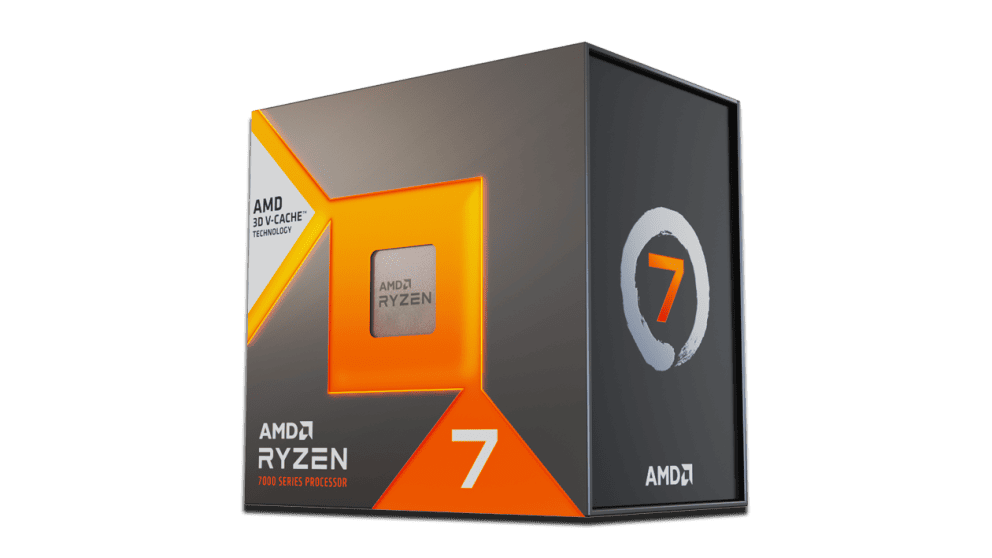
Table: Core Specifications
| Specification | AMD Ryzen 7 | Intel Core i7 |
|---|---|---|
| Base Clock | 3.0 – 3.8 GHz | 2.9 – 3.8 GHz |
| Boost Clock | Up to 4.7 GHz | Up to 5.0 GHz |
| Cores | 8 | 8 |
- Value: Both brands offer CPUs that provide value for their price, though Intel has often been highlighted as offering a good balance between gaming and productivity at a more accessible price point.
Choosing between them comes down to specific needs, budgets, and whether tasks favour core counts or clock speeds. Both AMD and Intel continue to refine their technologies, keeping the race for processor supremacy as lively as ever.
Performance Analysis
Choosing between AMD Ryzen 7 and Intel Core i7 requires understanding how they perform in general use, gaming, and heavy-duty tasks. This section breaks down their performance to help guide your decision.
General Performance
The AMD Ryzen 7 series and Intel Core i7 processors offer compelling performance for day-to-day computing. The Ryzen 7 typically features higher core and thread counts, which is a boon for applications that take advantage of multi-core processing. For example, the AMD Ryzen 7 5800X sports 8 cores and 16 threads, while the Intel Core i7-11700K comes with a similar setup. Clock speeds are crucial, too, affecting how fast each core operates: the 5800X has a base clock of 3.8 GHz with a boost up to 4.7 GHz, and the i7-11700K starts at 3.6 GHz, boosting up to 5.0 GHz.
- Core Count:
- AMD Ryzen 7 5800X: 8 cores, 16 threads
- Intel Core i7-11700K: 8 cores, 16 threads
- Clock Speeds:
- Ryzen 7 5800X: 3.8 GHz base, 4.7 GHz boost
- Core i7-11700K: 3.6 GHz base, 5.0 GHz boost
Gaming Performance
Gaming benchmarks show that both CPUs handle modern titles with ease, but there are nuances. The Intel Core i7-11700K often leads in games optimized for higher single-threaded performance due to its slightly higher clock speeds. For instance, titles like “Fortnite” and “Rainbow Six Siege” see marginal gains on the i7. However, the AMD Ryzen 7 remains competitive, especially in CPU-intensive games like “Cyberpunk 2077” and “Horizon Zero Dawn”.
- Fortnite:
- Intel Core i7: Slight advantage
- AMD Ryzen 7: Competitive performance
- Cyberpunk 2077:
- AMD Ryzen 7: Strong multi-core utilization
Productivity and Multitasking
In the productivity and multitasking arena, the AMD Ryzen 7 shines due to its robust multi-core performance. Tasks like video editing and 3D rendering benefit from the Ryzen 7’s ample cores and threads. The Ryzen 9 5900X, with even more cores, further extends AMD’s lead in this sector. Meanwhile, the Intel Core i7 keeps up well, and thanks to Quick Sync Video technology, applications that utilize it may see enhanced performance. The Core i9, part of Intel’s higher tier, provides a competitive option for the most demanding tasks.
- Video Editing:
- AMD Ryzen 7 & Ryzen 9: Excellent multi-core performance
- 3D Rendering:
- Intel Core i7 & Core i9: Competes closely, benefits from Quick Sync Video
Technical Specifications and Pricing
When comparing the AMD Ryzen 7 to the Intel Core i7, one must consider their technical specifications and how they translate to pricing. These factors are crucial in determining which processor provides better value for money and suits specific computing needs.
Process Technology and Architecture
The AMD Ryzen 7 processors, based on the Zen 3 architecture, are manufactured using a 7nm process node, which allows for a dense, energy-efficient design. This architecture supports PCIe 4.0, offering double the bandwidth compared to its predecessor. In contrast, the latest Intel Core i7 variants like the i7-12700K come with a combination of performance and efficiency cores, using Intel’s 10nm process technology and boast support for PCIe 5.0, the next step in PCIe standard evolution.
AMD Ryzen 7 (Zen 3):
- Process Node: 7nm
- PCIe Support: PCIe 4.0
Intel Core i7-12700K:
- Process Node: 10nm
- PCIe Support: PCIe 5.0
Power Efficiency and Thermal Design
Power efficiency is determined by the processor’s Thermal Design Power (TDP), which indicates the heat generated under the maximum theoretical workload. The Ryzen 7 models like the 7800X3D typically maintain a TDP that reflects its efficient power consumption, whereas Intel’s i7 chips, including the Core i7-12700K, may have higher TDPs due to their multicore designs, impacting heat output and power usage. Ryzen processors often couple high performance with lower power draw, translating to a cooler and quieter operation, especially important for gamers and content creators.
- Power Consumption:
- AMD Ryzen 7 7800X3D: Lower TDP, generally more energy-efficient
- Intel Core i7-12700K: Higher TDP, potentially higher power use
Pricing and Value
Price point is a decisive factor for many buyers, with AMD and Intel offering competitive pricing within similar performance tiers. For instance, a Ryzen 7 processor may provide a better price-performance ratio when paired with DDR4-3200 memory, strategically positioning itself as a budget-friendly yet powerful option. Conversely, Intel Core i7 CPUs can be priced higher but justify this with their advanced technologies and higher cache sizes. Customers must consider both the upfront cost and the potential savings in power consumption over time.
AMD Ryzen 7:
- More budget-friendly
- Excellent performance with DDR4-3200
Intel Core i7:
- Higher initial cost
- Future-proof features like PCIe 5.0 and larger caches
Frequently Asked Questions
Selecting the right CPU can be crucial for your computer, as it affects everything from gaming performance to everyday tasks. Here, we answer some of the common questions about the AMD Ryzen 7 and Intel i7 processors.
What are the performance differences between AMD Ryzen 7 and Intel i7 in gaming?
AMD Ryzen 7 processors tend to offer more cores, which can give them an edge in multitasking and games designed to use multiple threads. However, Intel i7 CPUs often have higher clock speeds, improving performance in games relying on single-thread speed.
How do the specifications of AMD Ryzen 7 compare to Intel i7 processors?
Ryzen 7 CPUs generally come with more cores and threads compared to their Intel i7 counterparts. For example, the Ryzen 7 5800X has 8 cores and 16 threads, while an i7-11700K also has 8 cores but only 16 threads. Both offer similar clock speeds, but architectures differ, affecting overall performance.
Which processor is more cost-effective for general computing: AMD Ryzen 7 or Intel i7?
It depends on specific models and their prices at the time of purchase. AMD Ryzen 7 CPUs often provide better value for multi-threaded applications due to higher core counts, while Intel i7 models are competitive, particularly for tasks that benefit from high single-core speeds.
How does the multitasking and productivity performance vary between AMD Ryzen 7 and Intel Core i7 CPUs?
AMD Ryzen 7 chips are typically strong in multitasking scenarios because of their additional threads. This makes them suitable for productivity tasks like video editing and 3D rendering. Intel i7 processors can keep up, especially in applications that prioritize faster single-core performance.
What are the power consumption and thermal performance characteristics of AMD Ryzen 7 versus Intel i7?
AMD’s Ryzen 7 series CPUs are known for their efficient 7nm process technology, which often leads to lower power consumption and better thermal performance compared to Intel i7 CPUs, which use a 14nm process technology. However, Intel’s newer models have improved their efficiency.
With regards to upgradability and future-proofing, which is the better option between AMD Ryzen 7 and Intel i7 series?
AMD has a reputation for supporting the same socket type for multiple generations, which can be a plus for future upgradability. Intel, on the other hand, traditionally requires new motherboards for new chip generations, though this varies by series and technology roadmap.

